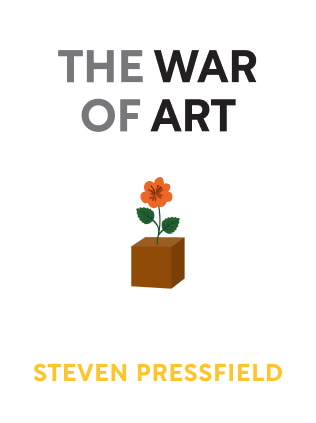

This article is an excerpt from the Shortform book guide to "The War of Art" by Steven Pressfield. Shortform has the world's best summaries and analyses of books you should be reading.
Like this article? Sign up for a free trial here .
Do you want to know how to become a full-time artist? How can you earn a living from doing what you love?
Many aspiring artists want to do what they love full-time, but struggle to make it happen. The key is to treat your passion like a day job, with regular commitment and a focus on productivity and results. Knowing how to do this will help you go from an amateur to a professional.
Find out how to become a full-time artist below.
How to Become a Full-Time Artist
The following advice will help you understand how to become a full-time artist. It can be difficult, but if you treat your art like a day job you can get some great results.
Treat Art Like Your Day Job
You are already a professional in one aspect of your life—you get paid for your services in your day job. The attitude you bring to your day job can help strengthen your role as a professional artist in the following ways:
- You work every day—Even if you don’t feel like going to your job, you do it because you have to. You have responsibilities and obligations, and if you didn’t show up, you’d get fired. Even when you’re sick, you manage to drag yourself to the office, store, or factory.
- You work long hours—You’re probably not mentally focused all day at your job. But when a customer needs help or your boss needs certain documents, you get the job done. You do the work because your workday isn’t over until you clock out.
- You will always work because you have to—Your job title may change or you may move to a different job, but you will work year in and year out because you have to support yourself. There are no other options short of winning the lottery.
- You deal with immense pressure—Your job pays for rent, mortgage, children’s tuition, food, and clothes. The pressure of keeping these things afloat is intense. It motivates you to show up and work hard.
- Your job is not your identity—You can enjoy your job and be proud of performing it to a high degree. You may put in overtime and stretch yourself thin to complete the work. But at the end of each day, you go home to your personal life. You are not your job, which means you are detached from it personally. When you’re detached, it’s easier to put your head down and finish your duties without fear.
- You trained to become efficient at your job—You’ve put in the time and effort to learn how to do your job well.
- You don’t take it so seriously—Your job is what you do for money, not the end-all and be-all of your existence. You can have a sense of humor about the work because it’s not personal.
- You receive feedback during evaluations—You’ve experienced praise and ridicule for your job performance. You know the evaluation is about the work and not about you.
Although your artistic work is done because of love, becoming a full-time artist means treating your creative work like a business. If you can carry these attitudes about your day job over to your artistic life, you will reduce resistance and increase your commitment.
The idea of treating your art like a business may make you cringe, but it is the main way to separate yourself from the amateurs. You must be committed to showing up for your art in the same way you’re committed to showing up to your job. You must put in the training to hone your craft. You must be willing to put your art into the world for judgment.
Whether you believe it or not, you need real-world validation as an artist. It’s what pushes you to grow and helps you understand how to grow. Failure is part of life for an artist. You have to learn to take it in stride. If you’re afraid to fail, you won’t try. Receiving a rejection or a poor review is just as valuable as an acceptance or rave review. You’ve completed a project and put it into the world. You have joined the battle. You are a professional.
Another useful aspect of your day job attitude is the idea of working simply to support yourself. As stated, your creative work is a product of love. If it isn’t, it’s not your true calling. But you can’t focus on love. Loving your art too much leads to fear. You become too precious with the work and take it too personally. These feelings can make you freeze when it comes time to create.
If you can think of yourself as an artist-for-hire, meaning you do it for the money, you can be detached from the work. You also view the work as a process needed to create a product, rather than an extension of your character. This level of detachment is resistance’s worst nightmare because it diminishes fear.
Be Your Own Boss
Being a professional means you come to the work with serious intention. You commit to the work as a professional, and that commitment is what guides you to your destiny. One way to concretize the transition from amateur to professional is to become a corporation.
Whether legally or metaphorically, creating a corporation for the artistic work helps in several ways. You become both the boss and artist. This mindset strengthens the idea of artist-for-hire, which further allows you to see the work as work and not a personal representation of your life. As a boss, you are more objective about the work. As the artist, you’re more resilient to resistance because you’re not personally attached to the outcome, which is for the boss to worry about.
Another beneficial aspect of corporate life is organization. In almost every company, Monday morning begins with a meeting to organize the needs of the company and delegate duties. You can hold this meeting with yourself and create a schedule of work you need to accomplish for the week. Again, this takes the ethereal out of “creating art” and makes it a business.

———End of Preview———
Like what you just read? Read the rest of the world's best book summary and analysis of Steven Pressfield's "The War of Art" at Shortform .
Here's what you'll find in our full The War of Art summary :
- Why creative people feel resistance when approaching their true work
- How to break down the wall that holds you back from reaching your potential
- How to tap into your creative power and honor the genius you were born with






